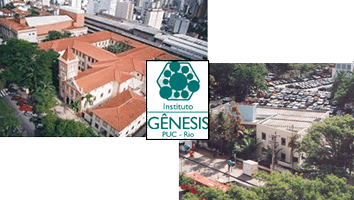
During our site visit we participated in three presentations:
1) Empresa Júnior
2) Silicon Strategy
3) Favela Receptiva
Instituto Gênesis is part of Pontifícia Universidade Católica do Rio de Janeiro (PUC Rio). PUC is the largest Catholic University in Brazil. Instituto Gênesis was established in 1997. The institute’s mission is to transfer knowledge from the University to society and contribute to the quality of life in the region, through the training of entrepreneurs and incubation of successful socially conscious companies.
Empresa Júnior
Empresa Júnior (Junior Enterprise) is a student managed and staffed consulting company that is part of Instituto Gênesis. Undergraduate students, with the assistance of professors, offer a wide range of multidisciplinary consulting services. The company strives to offer their clients professional services while giving students a unique personal and professional development experience.

The program gives students real world experience as they pursue their studies. The company has annual revenue of 380,000 reals and is 100% financially independent. The company has a rigorous selection process. In 2006 they received 786 applications and accepted only 13. Students going through the program are encouraged to decide a career path early and use their time with the company to develop the skills necessary for success.
The company consults in the areas of: public relations (communication), brand recognition (includes logo creation, web site, etc.), finance, international business planning, market research, marketing planning, quality certificates, HR, and IT (includes custom solution development, network infrastructure planning and web site development).
Empresa Júnior has an impressive client list, including Lufthansa, Petrobrás (Brazil’s oil explorer and refinery), Ipiranga (one of Brazil’s largest gasoline distributors), Light (electrical public utility company for the Rio metro area), and Domino’s Pizza.
Silicon Strategy
Silicon Strategy’s incubation started in 2006. The incubation has allowed the management team to take advantage of the University’s research centers and human resources. This support allows the company to focus on developing their core business and ensure success of young companies. The company’s founders have an invigorating entrepreneurial spirit and drive to offer quality services to their clients.
The company provides telecommunications management services and data network automation services. The company provides software applications and consulting services to an impressive client list. The clients listed on their web site include major players in the Brazilian telecommunications industry, local and federal government agencies and the Brazilian Army. More information can be found on the company web site at http://www.siliconstrategy.com.br.
Favela Receptiva
Favela Receptiva’s incubation started in 2005. The company promotes the social and cultural exchange between tourists and locals to promote development and improved quality of life for the residents of Vila das Canoas and Vila da Pedra Bonita; favelas near Rio de Janeiro. (Favela translates to “slum” in English). The company identifies families in the favela that have the facilities to host tourists; a unique bread and breakfast experience. Rates for rooms in the favelas are 55 – 65 reals a day with 50% of the revenue going to the host family. Tourists can choose from a host of activities as the favelas are located with easy access to the beach and the larger Rio de Janeiro area. The scenery and environmental soundings are breathtaking. The program also offers opportunities to work with the community residents in a variety of capacities.

The company relies 100% internet marketing through a partnership with Hostels.com (www.hostel.com). More information can be found on the company web site at http://www.favelareceptiva.com.
Our group had the privilege of touring Vila das Canoas and Vila da Pedra Bonita the day after our visit to Instituto Gênesis. We found a welcoming community that was surprisingly technologically advanced. We observed an extensive network infrastructure bringing the Internet into individual apartments via broadband; we observed several satellite dishes throughout the community. The community also had a small library with a computer laboratory connected to the Internet.